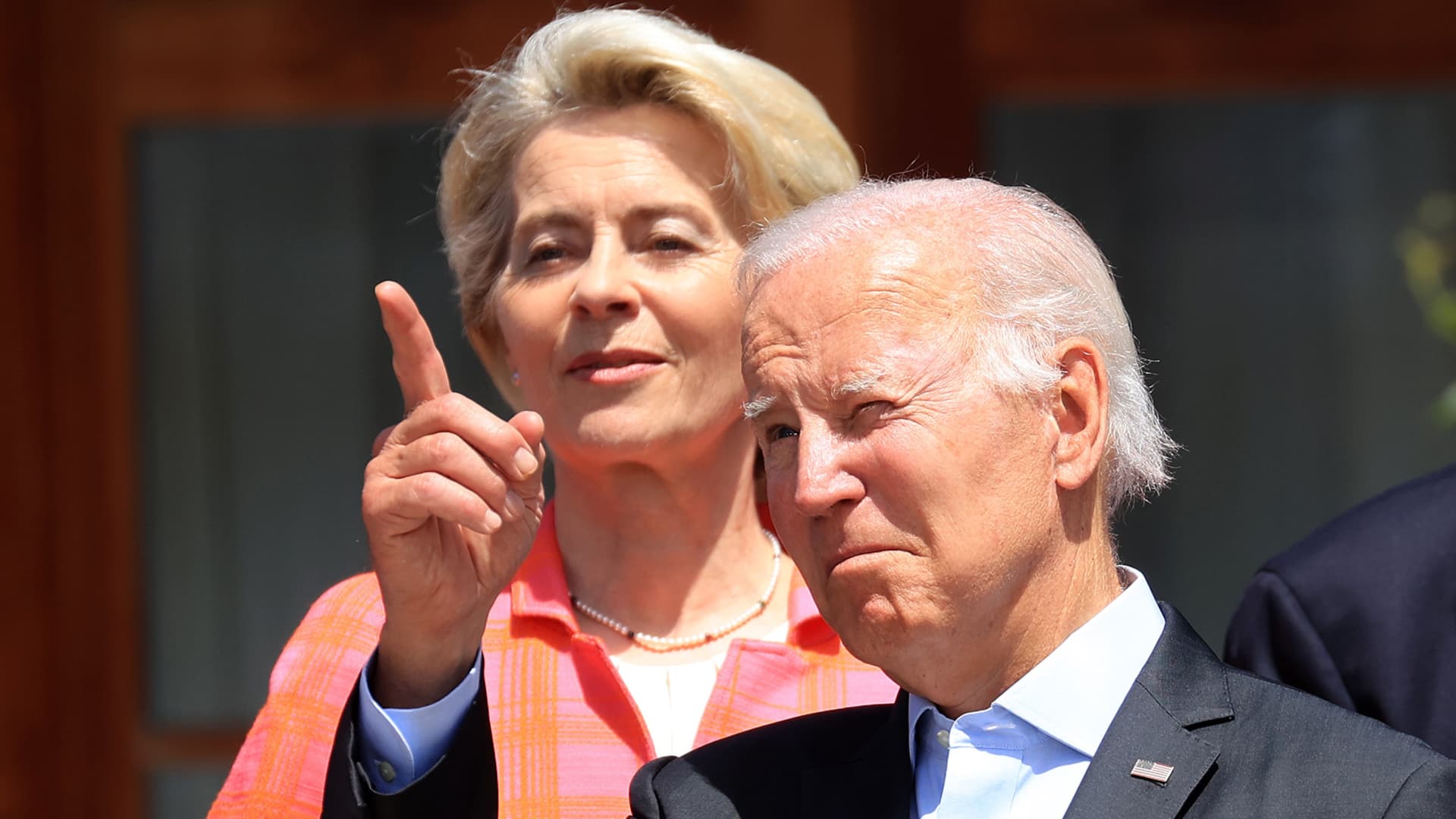The European Union is working against the clock to create a program to rival President Joe Biden‘s unprecedented climate subsidies. But it’ll face two key issues in the process.
The EU had, for a long time, asked the United States to be more active on climate policy. Biden delivered on that with the Inflation Reduction Act. But it has raised competition issues for European businesses — which has upset politicians in the region. Brussels has been left considering how best to respond.
“U.S. legislation doesn’t pass overnight,” Emre Peker, director at the consultancy group Eurasia, told CNBC, adding that the EU could have acted faster.
“The EU was asleep at the wheel … with 28 representations in Washington, Europeans could’ve done more to counteract the IRA before its adoption.”
The U.S. Inflation Reduction Act, also referred to as IRA, was approved by U.S. lawmakers in August and includes a record $369 billion in spending on climate and energy policies.
Among other aspects, it provides tax credits to consumers who buy electric cars that were made in North America — this could automatically make European-made EVs less attractive to buyers because they are likely to be more expensive.
We will continue to further invest into the region to achieve significant growth.Volkswagen spokesperson
Some European firms have recently announced investment plans in the U.S. to benefit from an anticipated pick-up in demand. And more could follow suit.
“Volkswagen has ambitious targets for the North American region. We now have a unique chance to grow profitably and to grow electric in the U.S.,” a spokesperson for the German company, one of the biggest car manufacturers in Europe, told CNBC via email.
Enel, an Italian energy firm, is concentrating 85% of its 37 billion euro ($40.2 billion) investments between 2023 and 2025 in Italy, Spain and the U.S.
“Specifically relating to public support policies, the IRA encompasses unprecedented measures on green tech and we think it could act as a stimulus for the EU to move forward in that direction, in order to support a substantial scale-up of renewable technologies which are key for our continent’s energy independence,” a spokesperson for the company told CNBC via email.
Luisa Santos, deputy director at BusinessEurope, a group of business federations, told CNBC that “it is still a bit early to say who will invest where.” “But it is very clear some companies will invest in the U.S. in any case,” she added, referencing an expected surge of investment toward the U.S. — at the expense of Europe.
Outspending others
European officials are currently looking at relaxing state aid rules so governments have more room to financially support key companies and sectors.
The European Commission, the executive arm of the EU, is due to present a proposal in the coming weeks.
But this solution might not be ideal. Countries with bigger budgets will be able to deploy more funds than poorer nations, which risks the integrity of the EU’s much-vaunted single market — where goods and people move freely and which accounts for more than 440 million consumers.
Belgian Prime Minister Alexander de Croo told CNBC that more state aid “is not a good answer.”
“There’s a level playing field [in Europe]. Belgium is a small market, very open economy, Germany is a big market. If this becomes a race of who has the deepest pockets we are all going to lose and it would lead to a subsidy war with the United States,” de Croo said earlier this month.
Several other experts have also raised concerns about easing state aid rules. Former Italian Prime Minister Mario Monti told Politico Europe this is a “dangerous” approach.
In a letter issued last month and seen by CNBC, Europe’s Competition Chief Margrethe Vestager said: “Not all member states have the same fiscal space for State Aid. That’s a fact. And a risk for the integrity of Europe.”
Slow to respond
In addition to challenges with state aid relaxation, timing is also a risk.
European officials will discuss and decide how to provide more green incentives for the medium to long-term. On the one hand, some argue that current European investment programs should be redeployed toward these subsidies. But on the other hand, others argue that the bloc will need to raise fresh cash to implement such a huge project.
Thus, it’ll likely turn into a deep and strained political matter that could drag for awhile.
Paolo Gentiloni, Europe’s economics commissioner, said Tuesday in Berlin that there are “different views” on the table.
“But I am satisfied there is a clear intention to engage in this discussion,” he said following conversations with Germany’s Finance Minister Christian Lindner, who’s previously stated he would not support new public borrowing.
